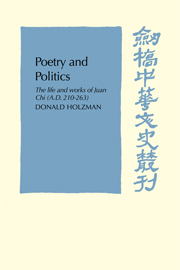Book contents
- Frontmatter
- Contents
- Dedication
- Preface
- Chinese Foreword by Jao Tsung-i
- List of Wei Emperors
- Introduction
- 1 The early Wei emperors
- 2 Tung-p'ing
- 3 Assassination and retreat
- 4 Anti-ritualism
- 5 Confucian essays and a strange understanding of Chuang-tzu
- 6 Society and solitude
- 7 The immortal woman
- 8 The pursuit of immortality
- 9 Mysticism
- 10 The Great Man
- 11 Poetry
- Conclusion
- Notes
- Bibliography
- Finding list
- Index
- Frontmatter
- Contents
- Dedication
- Preface
- Chinese Foreword by Jao Tsung-i
- List of Wei Emperors
- Introduction
- 1 The early Wei emperors
- 2 Tung-p'ing
- 3 Assassination and retreat
- 4 Anti-ritualism
- 5 Confucian essays and a strange understanding of Chuang-tzu
- 6 Society and solitude
- 7 The immortal woman
- 8 The pursuit of immortality
- 9 Mysticism
- 10 The Great Man
- 11 Poetry
- Conclusion
- Notes
- Bibliography
- Finding list
- Index
Summary
Juan Chi deliberately played a very minor role in politics; he played a very major role in society. To put it more precisely, his social behavior, which shocked and angered many of his contemporaries, is one of the best illustrations we have today of the state of social morality in third-century China. More than that, his figure, as it emerges from the numerous anecdotes told about his very bizarre behavior, has stood throughout history as the symbol of the reaction of the individual against the excesses of Confucian bigotry. But his position is by no means a simple one, as we shall see as we examine the elements that can still be assembled to describe it to us: his family background, his behavior as it appears in anecdotal literature and in a precious contemporary account, and in his own essays and poetry.
Juan Chi's political life shows us that he was a man of means, an important figure in the center of political activity solicited by the highest authorities to join them. His refusal to act only accentuates his potential force, his elevated status in society. What are we to make, then, of the following citation from the Shih-shuo hsin-yü? ‘Juan Hsien and Juan Chi lived to the south of the road and the other Juan lived to the north of it; the northern Juan were all rich, the southern Juan poor.’
- Type
- Chapter
- Information
- Poetry and PoliticsThe Life and Works of Juan Chi, A.D. 210–263, pp. 73 - 87Publisher: Cambridge University PressPrint publication year: 1977

